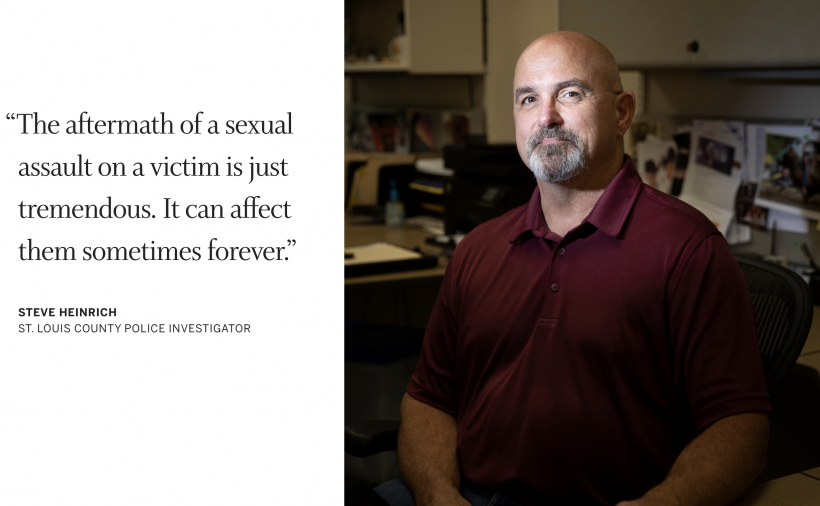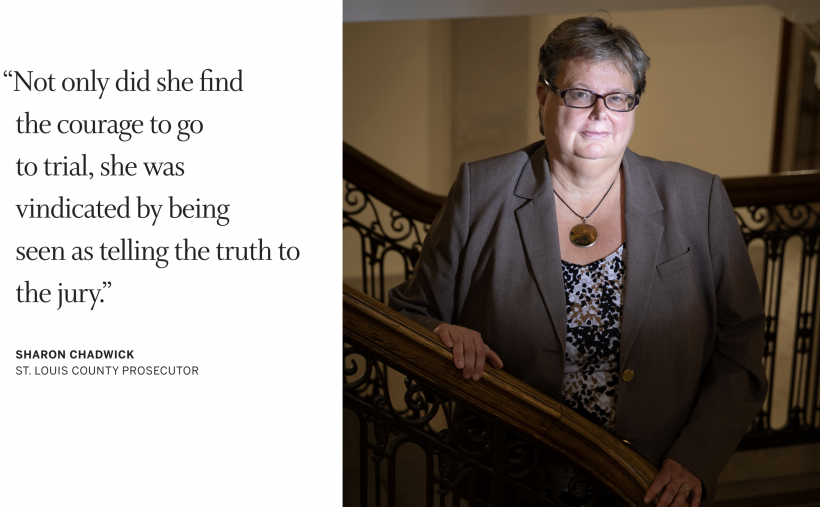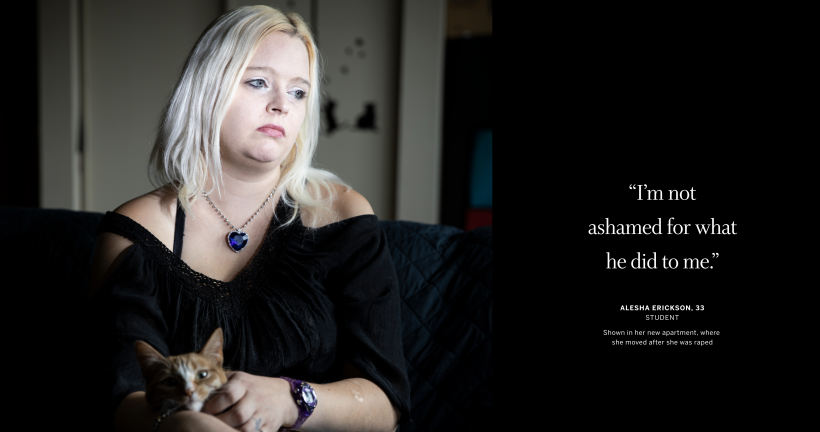Denied Justice
What happened when an investigator, an advocate and a prosecutor took a victim seriously from the start
MOUNTAIN IRON, MINN. — The telephone rang after dinner: A young woman was at the hospital, bruised and frightened, saying she had been raped.
Investigator Steve Heinrich told his family not to wait up. He headed out the door, into a case fraught with all the challenges that can complicate sexual assault investigations: The victim had a history of drug use and behavioral problems. She had been drinking with her assailant and had blacked out during the assault. The suspect insisted the encounter was consensual.
Hundreds of rape cases in Minnesota end right there, with a victim’s first police report, according to more than 1,300 case files reviewed by the Star Tribune. Time after time, documents show, law enforcement officials say no to victims who come forward to report an assault.
But this time, a caring cop, a confident prosecutor and a devoted advocate of victimized women on the Iron Range proved it’s possible to get justice even in the most difficult cases.
And they started simply by saying yes.
• • •
Alesha Erickson is visibly anxious when she opens the door to her cramped apartment in this small town on the edge of U.S. Steel’s vast Minntac mine pits. She has white-blonde hair, large eyes like pools of rainwater and a gentle manner that makes her seem far younger than 33.
For much of her life, Erickson has suffered from anxiety so severe that she struggled to make friends or, sometimes, even leave the apartment where two cats are her loyal companions. The disorder emerged in high school, according to her father, who said his daughter has also struggled over the years with drug use and parenting of her two children.
But by 2016 she was making progress. She was driving on her own again and even picked up a job application.
One night that summer she went out with her dad to the town’s annual “Merritt Days” festival, to hear the alt-rock band Sister Hazel. Kevin Erickson, a mechanic and trucker, dotes on his daughter, dropping by her place regularly for lunch and helping her run errands.
At the end of the night, as he dropped her off, they were approached by a man she had seen around her apartment complex. He asked for a light as her dad drove off. Alesha Erickson ran up to her apartment, brought back a lighter and a strawberry-flavored cigar for herself, and worked up the courage to talk to him.
His name was Aaron. He had a bushy mustache. He’d had a fight with his girlfriend and was happy for the company.
For Erickson, making such a connection was a breakthrough.
“I thought I was finally getting a friend. I was excited,” she recalled.
Aaron asked whether she had anything to drink, Erickson said, and so they went up to her apartment. They talked, drank some tequila shots and beer, and played Halo 4 on her Xbox. They even kissed on her couch.
Then, to her surprise, he bit down hard on her breast. Frightened, Erickson cried no, got up and went to the kitchen. Not sure what to do next, she poured another drink.
When they started talking again, she told him she had a disability and lived on public assistance, about $700 a month.
This enraged him, she recalled, and without warning he struck her in the face, threw her against a wall and began choking her. She thinks the impact knocked her out. The next thing she remembers, according to her police statement, is waking up in her bed, naked, with Aaron raping her as her head banged against the wall. Sobbing, she yelled for him to stop. He struck her in the back. She remembered turning and seeing a smile on his face.
Erickson said she blacked out again, and when she woke up he was gone. His white undershirt was on the floor.
On Monday afternoon Erickson’s father came to check on her. He found her still in bed, red marks on her face and neck. “I knew something was wrong right away,” he said.
They drove to the hospital, where Erickson finally told a doctor that she had been raped. All the while, she was fighting back anxiety and shame. What if police didn’t believe her because she’d been drinking? What if Aaron got mad and came for revenge?
The staff called 911.
When Sheriff’s Deputy Jeremy Belleville arrived, Erickson told him she had been raped by a man she knew only as Aaron. She said he worked at Walmart and lived somewhere in her apartment complex.
Heinrich, the investigator on call that night, arrived at the hospital a little later. Out in the parking lot, Belleville briefed him on Erickson’s account, noting that he had struggled to get much information from her.
They divided up the evening’s work. Belleville would try to find “Aaron.” A Facebook search quickly produced an Aaron McCulloch who worked at the local Walmart. A manager there provided the last address they had for him — the same apartment complex where Erickson lived. A second deputy went to fetch her stained bedsheet, which was about to be washed at her parents’ house.
Heinrich approached Erickson, still in her hospital gown, for a more detailed interview.
Even in plain clothes, at 6-foot-1 and with a shaved head, Heinrich has a formidable presence. But the 51-year-old investigator is also a father of 10, including seven foster children, some with disabilities. He guesses he has handled about 50 sexual assault cases in his career, though he hasn’t taken much specialized training in adult sex crimes. His specialty is computer forensics and arson, but he’s known for a calm, nonjudgmental interviewing style that sets people at ease.
“He’s always been very caring with crime victims,” said Jeanne Olson, a St. Louis County victim’s advocate.
Heinrich told Erickson he was sorry for her ordeal, and they chatted a bit about the street dance. Then he explained that he had to ask her some difficult questions.
“I talked to her almost like she was one of my kids, and she came forward with a lot more information,” Heinrich remembered.
By the time the detective left the hospital he had gleaned a lot of details. When he arrived with the deputies at Erickson’s apartment, everything matched her account, he said. The Xbox was loaded with the video game she had named. The liquor bottles were where she had described them. The suspect’s white tank top was there, too.
Just after 10 that night, Heinrich’s team knocked on McCulloch’s door. Out in the hallway and away from his girlfriend, McCulloch, 24, admitted that he had been in Erickson’s apartment drinking, according to the police report.
But he insisted nothing sexual had happened. Erickson had started acting strangely, he said, and he had left.
“Is there any reason I might find your DNA on her bedsheets?” Heinrich asked.
McCulloch’s head dropped. Then, police and court records show, he whispered that they might find “pre-ejaculate.”
While in custody down at the St. Louis County jail, McCulloch surprised Heinrich by agreeing to talk without an attorney. This time he admitted they tried to have sex, but he said he couldn’t maintain an erection. Erickson was crazy, he said.
Heinrich finished the interview, worked on his report, and then went home.
It was 6:30 a.m. He had to be back on duty at 7.

In almost every way, the investigation of Erickson’s rape was handled faster and more thoroughly than most sex crimes in Minnesota.
The Star Tribune review of Minnesota sexual assault reports from 2015 and 2016 found that, in three-fourths of the cases, detectives never visited the scene of the reported crime. In more than half the cases, they didn’t formally interview the victim or question the suspect named in the case.
Only one in four of the cases was ever forwarded to a prosecutor.
Those lapses in basic police work can doom a case, veteran investigators say. Because sexual assault often occurs behind closed doors and with no witnesses, corroborating a victim’s account with physical evidence — even a detail such as the game loaded on an Xbox — is crucial to winning cases.
“There’s no such thing as a he-said, she-said case,” said Carrie Hull, an Oregon police detective and instructor who has won national recognition for her work on rape investigation techniques. “When you say that, what you’re telling me is that you interviewed two people, and that’s it.”
• • •
Heinrich’s report landed on the desk of prosecutor Sharon Chadwick in the St. Louis County Attorney’s office.
A 56-year old lawyer with clipped gray hair, Chadwick has long handled juvenile delinquencies, child protection and child support cases. But for that one year, Chadwick said, she had transferred to the criminal division to try her hand prosecuting adult felonies.
Chadwick immediately saw the hurdles: The defense would seize on Erickson’s drinking, her past drug use and the fact that she had lost custody of her son and daughter, who are being raised by her parents.
Yet Chadwick felt certain Erickson would strike a jury as a trustworthy witness.
She also knew they could hold McCulloch for only 36 hours without charges. Even though the DNA lab results weren’t back from Erickson’s sexual assault exam, Heinrich’s team had begun gathering crucial evidence and McCulloch had told conflicting stories.
Chadwick charged him with three felonies. It would be the only adult sexual assault case Chadwick would take to a jury trial that year.
“I think I was probably fairly naive,” Chadwick reflected. “I thought it was a slam dunk.”
As Chadwick worked on the case against McCulloch, Jeanne Olson looked after Erickson.
Olson runs the Sexual Assault Program of Northern St. Louis County. At 62, she has become something of an Iron Range institution, cruising the courthouse and police department with a black planner jammed in a worn tote bag, her eyes always hidden behind dark glasses. An old case of Lyme disease left her with light sensitivity so extreme that she wears sunglasses even in court and in her dimly lit office above the police department.
Olson took Erickson under her wing, texting her regularly to see how she was holding up, driving her to meetings and referring her to a good therapist. Olson, who speaks with the husky voice of a smoker, calls herself the “nagging advocate,” an ally who reminds victims of their own strength.
The trial was set for March 2017, seven months after the incident. Erickson was terrified at the thought of facing McCulloch in a courtroom. Even with Olson’s support, she had fallen back into a state of deep anxiety. She was afraid to leave her apartment and walk down the hall to the laundry room. Her father was washing her clothes and buying her groceries.
“I was scared somebody else could hurt me,” she said. “I hated it.”
On the first day of the trial, when Kevin Erickson drove his daughter to the courthouse, he had to coax her out of the car. But she knew she had to testify, she said, or McCulloch might hurt someone else.
Even today, the echo of her heels clicking down the tile floor of Virginia’s 100-year old courthouse still rings in her head. She gripped a worry stone during her testimony.
Chadwick, too, was nervous. She likes to gird herself for court by humming a favorite movie theme song. For McCulloch’s trial it was “Danger Zone” from the film “Top Gun.” A colleague played it from his computer.
The trial transcript shows that McCulloch’s lawyer tried to cast the incident as a failed sexual encounter with a lonely, troubled woman. He brought up Erickson’s past drug use, noted that she had spent some of her limited income on tequila, and said her apartment bore no sign of a fight that night.
But Chadwick’s case was strong. Lab tests had found a match between McCulloch’s DNA and semen found in Erickson’s cervix. Heinrich’s team had collected important physical evidence. And Erickson, for all her fears, proved compelling on the witness stand.
The trial ended after five days.
The jury, eight women and four men, parsed every word of the rape charges over two days, according to foreman Justin Champa. They were deadlocked most of the time — 6-6 at one point — with all the men pretty firmly favoring conviction, he said. A few of the women gave virtually no credence to any of Erickson’s testimony, Champa said, but he found the prosecution’s physical evidence compelling.
“In my eyes he was an absolute rapist. The evidence bore that out,” Champa said. The game changer for him, he said, was that DNA from Erickson’s sexual assault exam proved McCulloch had lied to police when he said they didn’t have sex. There was semen everywhere, he said: “His credibility to me was shot.”
Champa, a 41-year-old father who works in construction sales, said he tried to keep jurors focused on the legal elements of first-degree criminal sexual conduct with force or coercion: Was there intentional penetration without consent; did it cause physical injury or severe mental anguish; and did the defendant use force or coercion?
They got to “yes” on that first charge. They acquitted McCulloch on the second charge, which involved mental impairment or physical helplessness of the victim.
“I’m proud, at least, that we were able to take a rapist off the street,” Champa said. “As a brother, father and a son … this situation is worst case.”
When the verdict came down Erickson and Olson were ecstatic.
“He’s going to go away and can’t do this again to anyone else,” Erickson said.

The verdict, like the investigation, made Erickson’s case an outlier. Of the 1,375 Minnesota sex assault cases reviewed by the Star Tribune, just 110 ended in a conviction.
This time, everything worked.
Olson had kept Erickson on board, providing important assistance to the prosecution. About 40 percent of Minnesota sexual assault victims drop out of their case at some point, making it hard for detectives and prosecutors to build a case. Erickson trusted Heinrich because he listened and believed her. His close questioning of McCulloch produced inconsistencies that helped the prosecution, Chadwick said. McCulloch’s insistence that they “sort of” had sex begged credulity, she said, and crucially, it was contradicted by the DNA results.
But in the end, Chadwick said, Erickson’s performance on the witness stand proved critical.
“There was just no guile about her. [She] came across as being a very caring person who … took responsibility for all the mistakes that she made. I think that made her compelling.”
If anything disappointed Chadwick, it was McCulloch’s eventual prison sentence. Under state guidelines, his conviction called for 144 months in prison, or 12 years. At sentencing, District Judge John DeSanto reduced it to 7 ½ years, an unusual departure from the sentencing guidelines.
DeSanto outlined his reasoning in a nine-point memo. The first one, Olson said, shocked her:
“The victim … initiated the sexual contact with the Defendant by inviting him to her apartment for drinks (shots of tequila and beer) and video games on [her] living room couch, during which [she] testified at trial that she voluntarily and consensually engaged in kissing and sexual touching with the Defendant.”
To Olson, it sounded like unvarnished victim-blaming.
“I literally had to put my hand over my mouth because I wanted to stand up and shout,” she said.
In an interview, DeSanto said that blaming Erickson was never his intention.
“I could just not see this [case] as onerous as the typical first-degree criminal sexual conduct … given the facts as a whole.”
In an e-mail from the state prison at Moose Lake last month, McCulloch insisted he is innocent.
“I am neither a rapist nor a violent drunk,” he wrote.
Because he maintains he is innocent, he hasn’t been allowed into what is otherwise mandated sex offender treatment.
“I have lost everything and have been forcibly removed from my life over a one-night stand,” he wrote.
For Erickson, the experience proved empowering. She was heard. She was believed — by police, by prosecutors and by jurors.
And it has changed her life. She has moved to a new apartment, continues seeing a therapist and takes Tai Chi classes at the Y to help master her anxiety. She even won a grant to enroll in Mesabi Range College.
Walking through the school’s front doors for the first day of class this fall nearly paralyzed her again, she said, like the day she entered the courthouse to face McCulloch.
Still, she says, “I made it.”
Erickson pulls out a class essay she has just written about the trial and the verdict, “Strength Within Fear,” and reads aloud:
“A wash of relief floods over me, being able to make it through, able to make it through this difficult journey for justice.
“I’m not ashamed for what he did to me. It’s not my fault. Now, I’m finally moving forward with my life. I’m never giving up.”
She pauses at the end, looks up, and smiles.
- Previous Section
Part 5: Rejected by the Prosecution - Next Section
Part 7: Convicted for Rape, Free from Prison Time








































































































